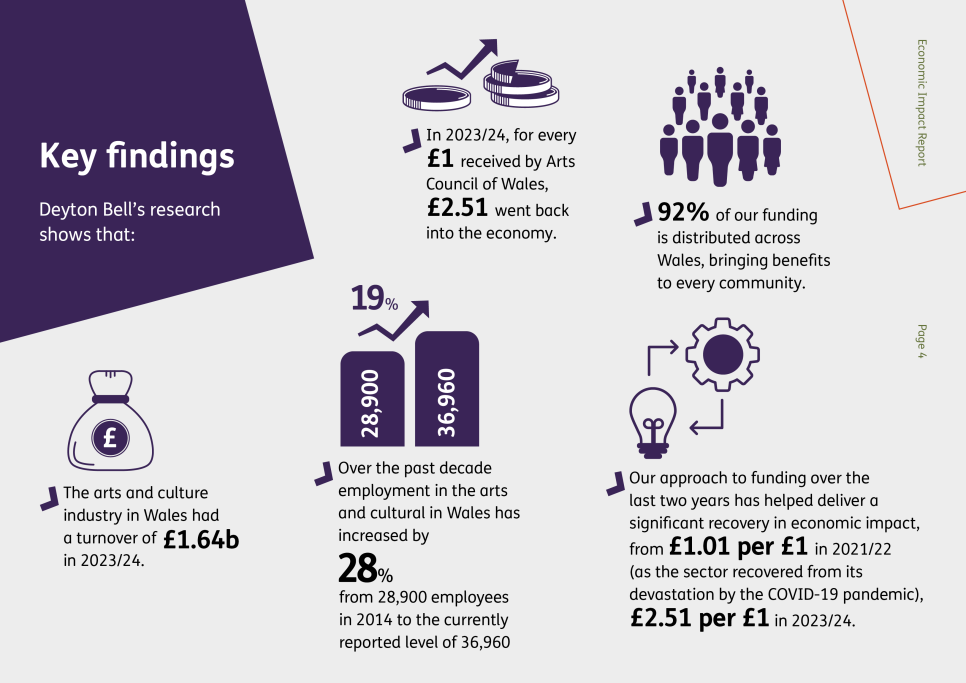A new report commissioned by Arts Council of Wales (ACW) demonstrates that the funding it distributes on behalf of the Welsh Government brings substantial economic benefit to the whole of Wales.
Conducted by independent research specialists Deyton Bell, Arts Council of Wales’s Economic Impact Report, released today, details the significant economic impact that the arts have on the Welsh economy and jobs. Ninety-two per cent of the funding ACW receives is distributed all over Wales to organisations and creative individuals.
Deyton Bell’s research shows that:
- In 2023/24, for every £1 of public funding received by ACW, £2.51 went back into the economy
- ACW funding is distributed across the country, bringing benefits to every community
- The arts and culture industry in Wales had a turnover of £1.64b in 2023/24
- Over the last decade, employment in the arts, culture and creative industries in Wales has increased by 28% - from 28,900 in 2014 to the currently reported level of 36,960
- ACW’s approach to funding over the last two years post-pandemic has helped to deliver a significant recovery in economic impact, from £1.01 per £1 in 2021/22 (as the sector recovered from its devastation by the COVID-19 pandemic) to £2.51 per £1 in 2023/24.

Chief Executive of Arts Council of Wales, Dafydd Rhys, says:
“At a time when there is huge competition for public funds, and during which we have experienced a 40% reduction in our own funding in real terms since 2010, we know that it’s vital to make the case for funding the arts sector in every way – for the joy the arts bring, the wellbeing the arts provide, the education arts deliver and, as we can demonstrate through this report, the financial and economic benefits the arts bring to Wales and its people.
“Deyton Bell’s independent research demonstrates a resilient and adaptable sector and offers strong evidence of its positive economic impact. We believe that Arts Council of Wales’s work contributes significantly to creating a more prosperous, resilient, healthy, equal and globally responsible Wales with cohesive communities, a vibrant culture and thriving language.”
In 2022/23 Arts Council of Wales adopted a new strategy for investing in artists and the arts, drawing heavily on the lessons learned in the pandemic – which highlighted the vital importance of long-term planning and adaptability. The new approach is focused on making sure that the projects it funds, deliver the objectives set out in the Arts Council’s Royal Charter, and offers grant recipients greater ability to flex and change the detail of what they are offering in response to changing circumstances.
This longer-term thinking is most visible in the increasing number of organisations receiving multi-year funding, which has risen from 67 (in 2022/23) to 81 (in 2023/24) and includes 23 organisations that are receiving multi-year funding for the first time, allowing Arts Council of Wales to extend its reach and to support more diverse creative initiatives.
Dafydd Rhys adds:
“Multi-year funding gives arts organisations greater abilities to experiment with new projects and new forms of income generation, diversifying their funding, improving their sustainability, and helping them to grow and contribute more to their local and the Welsh economies.”
Neil Darwin of Deyton Bell says their analysis shows that an increase in arts funding could provide an even bigger return on investment:
“We know that increased investment in the arts leads to greater returns per pound invested. A modest 10% increase in ACW’s funding from the 2023/24 levels could yield a growth in return on investment from £2.51 today to £3.29 by 2035. The analysis shows this could lead to the creation of 1,375 additional jobs in the arts– from major events to community support and grassroots activity.”

